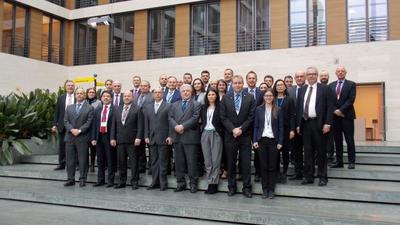-
Our work
-
Fields of work
- Arms control
- Border management
- Combating trafficking in human beings
- Conflict prevention and resolution
- Countering terrorism
- Cyber/ICT Security
- Democratization
- Economic activities
- Education
- Elections
- Environmental activities
- Gender equality
- Good governance
- Human rights
- Media freedom and development
- Migration
- National minority issues
- Policing
- Reform and co-operation in the security sector
- Roma and Sinti
- Rule of law
- Tolerance and non-discrimination
- Youth
- Field operations
- Projects
-
Meetings and conferences
- Summit meetings
- Review Conferences
- Ministerial Council meetings
- Plenary meetings of the Permanent Council
- Plenary Meetings of the Forum for Security Co-operation
- Security Review Conferences
- Annual Implementation Assessment Meetings
- Economic and Environmental Forum
- Economic and Environmental Dimension Implementation Meetings
- Human rights meetings
- Media conferences
- Cyber/ICT security conferences
- Conference of the Alliance against Trafficking in Persons
- Gender equality conferences
- Annual OSCE Mediterranean conferences
- Annual OSCE Asian conferences
- Partnerships
-
Fields of work
-
Countries
- All
-
Participating States
- Albania
- Andorra
- Armenia
- Austria
- Azerbaijan
- Belgium
- Belarus
- Bosnia and Herzegovina
- Bulgaria
- Canada
- Croatia
- Cyprus
- Czechia
- Denmark
- Estonia
- Finland
- France
- Georgia
- Germany
- Greece
- Holy See
- Hungary
- Iceland
- Ireland
- Italy
- Kazakhstan
- Kyrgyzstan
- Latvia
- Liechtenstein
- Lithuania
- Luxembourg
- Malta
- Moldova
- Monaco
- Mongolia
- Montenegro
- The Netherlands
- North Macedonia
- Norway
- Poland
- Portugal
- Romania
- Russian Federation
- San Marino
- Serbia
- Slovakia
- Slovenia
- Spain
- Sweden
- Switzerland – OSCE Chairpersonship 2026
- Tajikistan
- Türkiye
- Turkmenistan
- Ukraine
- United Kingdom
- United States of America
- Uzbekistan
- Asian Partners for Co-operation
- Mediterranean Partners for Co-operation
-
Structures and institutions
- Chairpersonship
-
Secretariat
- Secretary General
- Office of the Secretary General
- Conflict Prevention Centre
- Transnational Threats Department
- Office of the Special Representative and Co-ordinator for Combating Trafficking in Human Beings
- Office of the Co-ordinator of OSCE Economic and Environmental Activities
- Gender Issues Programme
- Opportunities for Youth
- Department of Human Resources
- Department of Management and Finance
- Office of Internal Oversight
- Documentation Centre in Prague
- Institutions
-
Field operations
- Presence in Albania
- Centre in Ashgabat
- Programme Office in Astana
- Programme Office in Bishkek
- Mission to Bosnia and Herzegovina
- Programme Office in Dushanbe
- Mission in Kosovo
- Mission to Moldova
- Mission to Montenegro
- Mission to Serbia
- Mission to Skopje
- Project Co-ordinator in Uzbekistan
- Closed field activities
- Parliamentary Assembly
- Court of Conciliation and Arbitration
- Organizational structure
- About us
News Item
How to enhance implementation of OSCE Code of Conduct on Politico-Military Aspects of Security focus of Berlin symposium
How to enhance the implementation of the OSCE Code of Conduct on Politico-Military Aspects of Security - a landmark document adopted in 1994 highlighting the governance of the security sector and the role of armed and security forces in democratic societies – was the focus of a symposium held on 22 and 23 November 2018 at the German Federal Foreign Office in Berlin...

- Issued on:
- Issued by:
- OSCE Secretariat
- Fields of work:
- Conflict prevention and resolution
How to enhance the implementation of the OSCE Code of Conduct on Politico-Military Aspects of Security - a landmark document adopted in 1994 highlighting the governance of the security sector and the role of armed and security forces in democratic societies – was the focus of a symposium held on 22 and 23 November 2018 at the German Federal Foreign Office in Berlin.
The discussion, initiated by Germany, Switzerland, Austria and supported by the OSCE Conflict Prevention Centre, gathered 35 officials and representatives from across the OSCE region, including representatives of foreign, defence and interior ministries, members of the armed forces and other representatives involved in the normative work and in the Annual Exchange of Information on the Politico-Military Aspects of Security as stipulated by the Code.
The participants discussed suggestions that were compiled during the Annual Discussion on the Implementation of the Code of Conduct on Politico-Military Aspects of Security which took place on 13 June 2018. The suggestions point the way ahead for the Code of Conduct, concerning in particular ways to improve its implementation. In the working sessions, participants discussed their experiences and best practices in implementing the inter- and intra-state level commitments and principles enshrined in the Code.
Addressing the symposium, OSCE Parliamentary Assembly Special Representative Andreas Nothelle underlined the Assembly’s strong involvement in the Code of Conduct’s creation. “It is easy to understand that an agreement on what is good conduct and subsequent mutual adherence to the principles can be a powerful confidence-building principle,” he said.
The OSCE Code of Conduct contains key principles and commitments agreed by the 57 OSCE participating States related to security relations between states and to the democratic control of all armed and security forces within a state.
The symposium, which was funded with donations from Germany and Switzerland, served to promote the Code and helped to strengthen its implementation in accordance with the suggestions made by OSCE participating States.